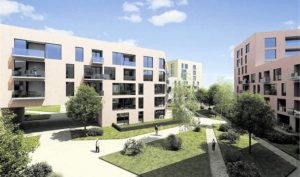Persons responsible for house administration
Generally it is possible to say that the owner of the apartment house is responsible for the administration of the apartment, irrespective of whether it is a natural or legal person (eg a municipality or a housing cooperative).
A wholly specific legal entity is the unit of unit owners who is the person responsible for managing the house and the land where the house is divided into units – compare § 1190 and § 1194 (1) of Act No. 89/2012 Coll., The Civil Code, as amended (hereinafter referred to as the CT).
SVJ
Let us stop for a while at the unit owners’ association, which is a specific legal entity, established for the purpose of securing the management of the house and land (Section 1194 of the Commercial Code). However, the person responsible for the management of the house and the land is the community of the owners, and if not, then the administrator is responsible for managing the house as a person with a specific status. Be careful not to interfere with the person responsible for securing certain activities of the administration of the house and the land (so-called operative manager) within the meaning of Section 1208 h) OZ.
The performance of the administration is, in fact, a direct exercise of the part of the ownership rights of the dwelling co-owners who can not perform them by themselves. House and land management, according to the definition of the law, includes everything that does not belong to the owner of the unit and what is in the interest of all co-owners necessary or expedient for proper care of the house and land as a functional unit and preservation or improvement of common parts. Housekeeping also includes activities related to the preparation and implementation of changes to the common parts of the building by adding, modifying or changing usage, as well as by establishing, maintaining or improving the equipment in the house or on the land serving all the co-owners of the house (Section 1189 (1) ).
The report also applies to common parts that are used exclusively by one of the co-owners, which is in practice used for the management of common parts that are used for example as a parking space.
In cases where the unit owners’ association has not yet arisen, the controller is the person responsible for managing the house and the land. However, the administration of the house is governed by certain rules, and by those which are determined by law (§§ 1191-1193 of the OZ, but also by the conventions for the convening and conduct of the assembly) and by those specified in the declaration.
A similar situation occurs also in cases of the so-called deferred formation of the unit owners’ unit, ie in cases where the unit-owners’ union was established, but only after the founder lost most of the votes and filed a proposal for registration of the unit owners’ unit in the public register § 1202 and 1203 OZ). Even in these cases, the law foresees the existence of the person of the house manager and the land, which is the majority owner of the units.
Operative Administrator
In order to make the situation a little more complicated, it is necessary to distinguish between the described administrators and the person who was responsible for securing some management of the house and the land. Such a person is often referred to as an “Operator”. Very often, however, it will be referred to as “housekeeper” or “administrative firm”. And again, she may be a natural or legal person.
Operator’s house and land services can be used (and in practice very often used by) all categories of apartment owners (municipalities, private owners or housing cooperatives) and unit owners where the administration does not act directly through their statutory body. In the case of housing co-operatives, the majority of minor housing co-operatives (the one-person) are to be managed by the third party, while larger housing co-operatives have their own employees for the management of apartment buildings, and even often provide activities related to the management of houses and land and non-members of housing cooperatives.
Primary responsibility for the management of the house and the land is always borne by the owner of the apartment house, or by the members of the statutory body of the unit owners. Therefore, if the housing corporation (unit owners or housing association) entrusts the management of the common parts of the house to the operative manager, it should primarily be understood by the members of the corporate body of the housing corporation. They are responsible for the performance of their duties as a member of the statutory body.
The responsibility for the performance of the function of a member of an elected body of the corporation (be careful, not necessarily just about the statutory body!) Is governed primarily by § 159 (a) CT and stands on three pillars of performance:
1. with the necessary loyalty,
2. the necessary knowledge and skills;
3. with care.
In principle, it can be said that the ordinary farmer acts responsibly and conscientiously in the affairs of the legal entity, and carries out the entrusted property as if it were his own property. At the same time, of course, it is not assumed that a good farmer could be just one who has all the necessary knowledge. It is important to be able to recognize the potential threat and prevent such damage, either by turning it away by itself or with the help of a third party. The last sign is to keep a proper record of the company’s accounting and management, as well as diligence in carrying out other activities related to the management of the house and the land.
Prepared by: Mgr. Martin Kroh, Czechoslovakia
How to get support for energy savings. This will be handled by another series of seminars

05.02.2018
The Ministry for Regional Development, in cooperation with other partners, has already prepared a third series of seminars on energy savings.
Thanks to them, the participants will be introduced to the possibilities of building insulation, exchange of heat sources and construction of new low-energy buildings, both from European funds and from national programs. The seminar will be held from February to April of this year in all regional cities.
Seminars are for the general public. They will help with focusing on energy savings for public buildings, businesses and family and apartment buildings. Useful information can be drawn by both non-business individuals, entrepreneurs, housing co-operatives or community owners, as well as municipalities or non-profit organizations. The seminars are organized by the Eurocentres, which in the regions fulfill the role of information network about the European Union and possibilities of support from European funds, in cooperation with the Ministry of Industry and Trade, the State Environmental Fund, the State Fund for Housing Development and the Center for Regional Development of the Czech Republic.
Participation in seminars is free of charge, however, the number of participants is limited, so it must be registered in time. The expected duration of the seminar is from 9.00 to 14.00.
Further information, including registration for individual seminars, is available below or in the Events Calendar at www.dotaceEU.cz
You can find the dates and places of each seminar here. (REFER TO: http://www.mmr.cz/getmedia/ce1e2cdc-ce66-4c04-b7fd-89ffd9971002/Bez-nazvu_11.png)
Source: MRD
Liberec restored the tradition of the Architects’ Council

The city continues the defunct tradition of the Council of Architects, which will be the advisory body of the Mayor, designated representative and the chief architect department.
The seven-member council, which will include two experts from abroad, will deal with city development, architecture, urbanism and will comment on spatial planning or public space. The Mayor of Tibor Batthyan initiated the renewal of the Architects’ Council. Inspiration was the successful working advice in the Austrian cities.
“I consider this solution more professional and financially more affordable than the city architect. The position of the urban architect would be more or less a clerical poster with a further demand for job creation. In such crucial matters as land planning and urban planning, I consider the plurality of expert opinions to be more important than the one man’s perspective, “explained Mayor Tibor Batthyan.
It is precisely professional opinions that are often lacking in discussions and decision-making processes. “The development of the city and investor relations is usually spoken of at a lay level, where personal feelings and politics play a part. The Architects’ Council, made up of a team of predominantly independent experts, brings expertise to these processes, and I believe that it will gain respect for politicians, citizens, investors, builders and, last but not least, local architects and urban planners, “said the mayor who attended the introductory meetings of the Council of Architects at the premises of the Liberec City Hall.
The chairman of the Architects ‘Council was elected at the inaugural session by the Prague architect Josef Smutný, who is the advisor to the Mayor of Tibor Batthyány in the area of town planning and architecture, and who was from the very beginning a professional guarantor of the Council of Architects’ Council. Other members include Prague architects Martin Kloda and Jakub Cigler, Liberec architect Jana Medlikova, Architect of the City of Liberec Petr Kincl and foreign architects Peter Gero (Hamburg) and Christoph Braumann (Salzburg). All members of the Architects’ Council were selected after several meetings between the Mayor, the architects invited and the chief architect’s staff.
“I’m glad we managed to find experienced experts who want to be in the Architects’ Council. As for foreign architects, with Mr. Gerem and Mr. Braumann, I met last year at an international conference on European city planning and this meeting assured me that we had decided right, “said the mayor. Foreign experts, according to him, should be invited most often in matters of major strategic importance. “I can imagine that we will invite them, for example, when the serious interest of a large foreign investor appears. Experience from abroad for us at this time will be very valuable. Especially when we realize that Salzburg, where architect Christoph Braumann is, is morphologically and urbanistically, and incredibly similar to Liberec, “the mayor added.
Having a team recognized by foreign experts is also pleased with the chairman of the Liberec Architects Council, Josef Smutný. “I consider Peter Gera’s experience not only of the construction of Hafen City in Hamburg and Christophe Braumann of Salzburg Regional Planning as an excellent opportunity for the entire city of Liberec. As part of their first invitation to Liberec, it would certainly be beneficial to organize, for example, a public lecture that would certainly be interested in a lot of people, including local architects. At the same time, it would be a good opportunity to publicly present itself to the Architects’ Council, “suggested Josef Smutný.
“I’m sure our team will build respect for both lay and professional public. I was pleased that the representatives of the three Czech cities, which attracted our vision, were approached by me during the preparations and discussions on the form of the Architects’ Council. We are going to visit the meeting of the Architects ‘Council in Linz and possibly in Salzburg to see how the negotiations and the subsequent implementation of the conclusions in the already successful and recognized architects’ councils are taking place, “concluded Josef Smutný, with the main inspiration for the final format and status of Liberec The Council of Architects was the model of a board of architects from Innsbruck, Austria.
Source: the city of Liberec

